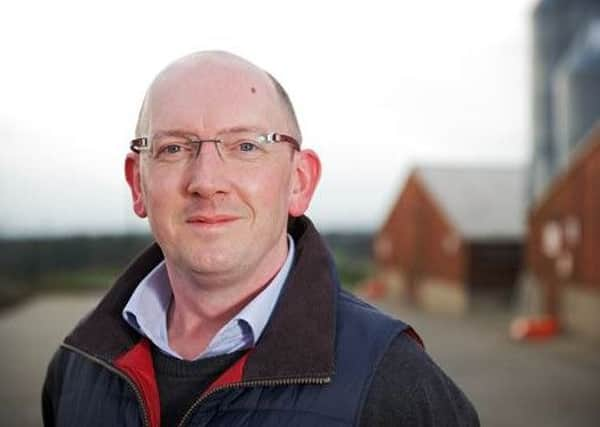UFU men who lobbied to delay RHI cost controls personally benefited


The details emerge from the second and final list of RHI claimants who have received over £5,000 which was yesterday published by Stormont’s Department for the Economy.
The list is published in full in today’s News Letter.
Tom Forgrave, the then vice chairman of the UFU poultry committee, installed four RHI boilers just before cost controls were put on the scheme in 2015 and has already been paid almost £120,000 for them.
Advertisement
Hide AdAdvertisement
Hide AdThe Ballymoney farmer already had six RHI boilers at that point and has in total been paid £748,116.
In February, the News Letter revealed details of leaked internal UFU emails which showed that in the summer of 2015 Mr Forgrave had vigorously lobbied to delay the introduction of cost controls at a point where the department knew that it desperately needed to rein in the costs of the scheme.
Stormont paperwork obtained by this newspaper also showed that in a July meeting with officials Mr Forgrave objected to the rate at which the cap was to be set, saying that “1,314 hrs [the cap in GB] too low for poultry”.
The UFU itself endorsed Mr Forgrave’s stance and lobbied to delay cost controls. Its president at the time was Ian Marshall. Yesterday’s list shows that Mr Marshall – whose boilers are under the name of his wife, Lesa – installed two 99kwth RHI boilers just five days before cost controls were finally imposed after multiple unexplained delays. To date he has been paid £58,795 for the heat produced by the boilers.
Advertisement
Hide AdAdvertisement
Hide AdThere is no suggestion whatsoever that either man abused the scheme by generating unnecessary heat to make money.
Mr Forgrave highlighted that his decision to install additional chicken sheds and RHI boilers had been taken in October 2014 and at that point he had agreed on a loan for the project. He said that he had installed the boilers once the sheds were built in October 2015, adding: “It is a 12-month lead-in time – not exactly a last minute decision.”
Mr Marshall said that he had installed the boilers due to a change in his business because he was leaving dairying. He said that he began the process of installing the boilers long before the UFU had asked for a “grace period” to delay cost controls for at least some individuals.
Both men stressed that they had been audited by both PWC and Ricardo, with neither company raising any concerns about their installations.
Advertisement
Hide AdAdvertisement
Hide AdThe UFU said: “The Ulster Farmers’ Union role is to press for fair treatment of our members. It should not come as a surprise that we pressed for a grace period for those who had applications in the pipeline, and who had already committed to putting in boilers and associated works.
“Installing boilers in a farming situation involves considerable time for planning, commitment to capital expenditure and installation.
“We believed it would be unfair if the rules were changed before farmers could complete planned installations.
“We have lobbied on a similar basis over other renewable developments, including small scale wind turbines. This was about fair treatment for those who had not completed projects. Energy costs are a major issue for farmers, particularly in the poultry and mushroom industries, and we saw the RHI as an opportunity to tackle that problem in rural areas.”
Advertisement
Hide AdAdvertisement
Hide AdMeanwhile, in a statement last night the UFU criticised the decision to release the names, claiming that doing so “deflects attention from the major failings of civil servants” and that “this only serves the interest of the department, not the wider public”.
Chief executive Wesley Aston said that the list did not explain the huge investments which claimants had made and which – if the retrospective Stormont cost controls survive the current High Court challenge – now cannot be repaid at the same rate if payouts are slashed.
Mr Aston also rounded on the media, saying: “The media has little interest in the positive side of the RHI scheme. Instead we have seen legitimate users vilified on the basis of claims now shown to be unfair and inaccurate. I believe this is not only shameful, but a sad reflection of how the mainstream media now reports events.”
£900k for one poultry farmer
As expected, some of the biggest payments on the RHI list are to poultry farmers, because they have a huge legitimate requirement for heat.
Advertisement
Hide AdAdvertisement
Hide AdProminent poultry farmer Fred Maxwell of Maxwell Farms in Augher has claimed £904,411 for ten 99kwth boilers, the first two of which were installed in mid-2013 and all of which were in place before the spike.
Another poultry farmer, Dungannon man Gareth Nelson, has received almost £680,000 for ten 99kwh boilers.
Many farmers had already been named in the first list which was published in March.
It related to companies, which involves many farms, but did not include individuals – even though many individuals were claiming on behalf of companies.
Advertisement
Hide AdAdvertisement
Hide AdYesterday’s list, reproduced on pages 23 to 34 of today’s News Letter, incorporates the first list, meaning that it includes every name made public so far.
Last week one man failed in a court bid to stay anonymous.